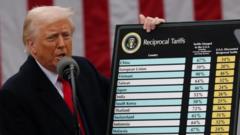In a decisive vote, Boeing workers have approved a new contract that promises a substantial 38% pay increase over four years, concluding a challenging seven-week strike that began on September 13. This walkout, involving approximately 30,000 workers from the International Association of Machinists and Aerospace Workers (IAM), caused severe disruptions in Boeing's production lines, amplifying existing operational crises within the company.
Boeing Workers End Strike with Landmark 38% Pay Increase Deal

Boeing Workers End Strike with Landmark 38% Pay Increase Deal
Boeing's seven-week worker strike concludes as union members endorse a significant pay rise, aimed at restoring industry stability.
The IAM reported that 59% of its members voted in favor of the agreement, which also includes a one-time bonus of $12,000 and modifications to retirement plans. Union leader Jon Holden emphasized that this victory represents a critical assertion of respect and fair wages for workers. Boeing's CEO, Kelly Ortberg, recognized the difficulties encountered during the strike, stressing the need for collaboration to restore the company's prestigious reputation.
The federal government took the strike seriously; acting US Labor Secretary Julie Su was involved in mediation efforts in Seattle. The strike has substantially impacted Boeing’s finances, with losses approximating $10 billion, according to economic analysts. Recent reports revealed that the company's commercial aircraft sector incurred $4 billion in operating losses for the third quarter, leading Boeing to consider layoffs impacting around 17,000 employees, set to commence with notices as early as mid-November.
Boeing has faced a multitude of challenges this year, including a significant incident involving a mid-air passenger plane structural failure and setbacks with its Starliner space project. Additionally, the company launched a share sale endeavor aimed at raising over $20 billion, in light of urgent needs for financial liquidity and impending credit rating downgrades. Advocates for the workers, meanwhile, celebrate this development as a vital step towards better treatment in the tumultuous aerospace sector.
The future holds uncertainty for Boeing, not only regarding its operational strategy amid lingering issues but also concerning its capacity to maintain workforce stability and investor confidence in the wake of recent industrial actions.
The federal government took the strike seriously; acting US Labor Secretary Julie Su was involved in mediation efforts in Seattle. The strike has substantially impacted Boeing’s finances, with losses approximating $10 billion, according to economic analysts. Recent reports revealed that the company's commercial aircraft sector incurred $4 billion in operating losses for the third quarter, leading Boeing to consider layoffs impacting around 17,000 employees, set to commence with notices as early as mid-November.
Boeing has faced a multitude of challenges this year, including a significant incident involving a mid-air passenger plane structural failure and setbacks with its Starliner space project. Additionally, the company launched a share sale endeavor aimed at raising over $20 billion, in light of urgent needs for financial liquidity and impending credit rating downgrades. Advocates for the workers, meanwhile, celebrate this development as a vital step towards better treatment in the tumultuous aerospace sector.
The future holds uncertainty for Boeing, not only regarding its operational strategy amid lingering issues but also concerning its capacity to maintain workforce stability and investor confidence in the wake of recent industrial actions.























